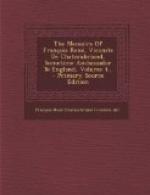|
This section contains 8,609 words (approx. 29 pages at 300 words per page) |

|
SOURCE: Moscovici, Claudia. “Hybridity and Ethics in Chateaubriand's Atala.” Nineteenth-Century French Studies 29, nos. 3-4 (spring-summer 2001): 197-216.
In the following essay, Moscovici argues that Atala challenges French Romanticism's dichotomy between nature and culture in its representations of Western and Native American cultures. Rather than positioning these cultures as ethical opposites—with the implicit superiority of Western culture—Chateaubriand's work offers a model of hybrid cultural identity.
The figure of the noble savage constitutes one of the defining features of French Romanticism. As contemporary criticism points out, this figure is riddled with ambivalence. While savage cultures may epitomize an innocent state of nature by way of contrast to a dissolute Western civilization, they also represent a less developed social organization that makes Western societies appear superior by comparison. Rousseau's works perhaps best capture the philosophical ambivalence of early Romantic representations of savage cultures.1 On the one hand, Rousseau praises the...
|
This section contains 8,609 words (approx. 29 pages at 300 words per page) |

|


